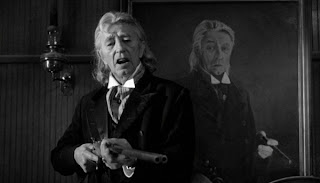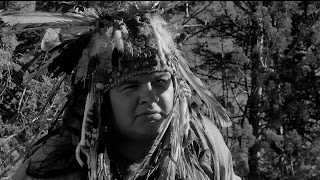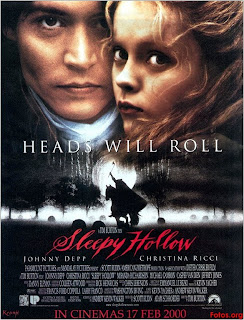I have a confession to make. I haven't been spreading my love equally across the great horror franchises. When I started this blog, I quickly reviewed a few of the original
Nightmare movies, but I got distracted by shiny objects and never really got back on track. In the meantime, I have reviewed every single
Friday the 13th and most of the
Halloweens. Out of a sense of fairness, it is high time I returned to the
A Nightmare On Elm Street franchise, and where else should I start, but with the original?
A Nightmare On Elm Street begins with a mysterious figure crafting an all-purpose murder glove in a boiler room somewhere. Coincidentally, Tina (
Amanda Wyss) has a nightmare where she is chased by a mysterious figure wearing a murder glove! It's always nice when you don't have to wait for plot points to pay off. Tina runs from this creepy, fedora-and-ugly-sweater-wearing, razor-gloved meanie, but he catches up with her.
 |
| Maybe he just wants a hug |
Right when he is about to kill her, Tina wakes up screaming in bed. It was just a dream! Except...her nightgown has slash marks in it, right where her nightmare man cut her! Dum-dah-DUMMMMMM!!! On a side note, teenagers wear nightgowns? Anyway, Tina's not the only teen having dreams like this. Her boyfriend, Rod (
Jsu Garcia), her friend, Nancy (
Heather Langenkamp), and Nancy's boyfriend, Glen (
Johnny Depp, in his film debut), have all been having nightmares; despite Tina being openly creeped out by her dream, none of her friends comes forward and admits to having similar nightmares because teenagers don't have empathy.
 |
| Or props that make sense in their scenes. What is with the birds by the boombox? |
Since Tina makes such a big deal about her dream, Nancy and Glen agree to keep her company while her parents are out of town. Rod shows up, too, just in time for some sex scenes that sound remarkably like people trying very hard to sound like they're having all the sex in the world. After Rod finishes pleasing his woman, this happens:
 |
| He becomes the Magneto of flesh? |
An invisible attacker slices the hell out of Tina and then, just for giggles, reverses her personal gravity; this was done presumably to force her family to clean her bloody footprints off the ceiling, which looks suspiciously like a deck. That's when things go a little crazy. The police, led by Nancy's estranged police lieutenant father (
John Saxon), assume that Rod killed Tina (...on the ceiling...?) because he was the only one in the room. Rod eventually gets caught and winds up in prison, but not before admitting to Nancy that he has had nightmares about a man with a razor bladed murder glove. This blows Nancy's mind. To be fair, it should. That night, as she is dreaming, Nancy watches Mr. Razorfingers entering Rod's cell, preparing to kill. When she wakes, Nancy knows that Rod is in danger, but no one believes that an invisible dream monster is going to attack him. They should have, because Nancy was right. After this point, Nancy is a teen on a mission: stop this mysterious dream monster! Or at least find out who he is!
 |
| ...before he falls through that latex wall and lands on her damn head! |
The acting in
A Nightmare On Elm Street is not very good. In the lead role,
Heather Langenkamp is pretty awful and sadly doesn't die (or does she...?). She didn't annoy me, but she's not very likable and has trouble with any part of her character that can't be described as a "wet blanket."
Amanda Wyss was a little better as Tina, although she was also pretty basic.
Jsu Garcia was one-dimensional, but his one dimension was that of an insensitive rebel-type, and he did that fairly well.
Johnny Depp wasn't much better, with some of his line readings (especially "WoooOOOOoooo") being painful to watch. On the bright side, his character didn't demand much acting, and Depp at least managed to get the most memorable death scene in the film.
 |
| If you're not going to be good in a movie, at least try to die well |
Robert Englund spends most of this movie in the shadows as the evil Fred (not Freddy) Krueger. Freddy doesn't display his trademark humor or cackle much in this first entry, but I think some of the visuals with Freddy are at their most iconic here.
 |
| That's a great introduction shot |
Still, Englund isn't at his best here, if only because the script is not sure what direction they want the character to go; Freddy is a presence in this movie more than he is an actual character.
John Saxon actually headlined this movie, which is hilarious in retrospect. In turn, he was about as good as John Saxon normally is --- he's a perfectly acceptable B-movie actor. Rounding out the main cast,
Ronee Blakley was absolutely horrible in every conceivable way as Nancy's alcoholic mother. In all fairness, her character is terrible. Still, Blakely should be able to act circles around Heather Lagenkamp (she is an Oscar nominee, after all), and that just doesn't happen here.
A Nightmare On Elm Street was written and directed by
Wes Craven, after he read about (I shit you not)
Asian Death Syndrome. The basic idea here is a chilling one: what if the danger in your dreams was real? As such, Craven goes out of his way to make a menacing villain, and he does so with some great visual scenes.
 |
| That's not Freddy. That's a subtle warning to not date Nancy. |
As far as his direction of the actors goes, Craven did a pretty awful job. I honestly couldn't tell you if this cast had their lines memorized or were using cue cards. The pacing in the film is okay, but it's a little slow for a slasher movie. And that's what this is, oddly enough. There are elements in the plot that could have made this far more suspenseful and frightening, but Craven opted for a simpler (and dumber) take. I like the basic idea, but it's not very scary, exciting, or unpredictable, despite having the whole dream monster angle.
The special effects in
A Nightmare On Elm Street had some definitely good moments, but it's pretty inconsistent overall. Glen and Tina's death scenes are pretty great, no doubt about it. I don't know what it is that makes them so memorable --- is it just the fact that they wind up on the ceiling? --- but they definitely stand out in the genre. I also really like the moments where the audience is aware of Freddy's presence, but Nancy is not, like when he pushes his face in the wall above her bed, or when she is sitting in the bathtub. Unfortunately, there are also moments like this:
 |
| Unless those are expanding dildos coming out from his shoulder, I'm not impressed |
Why is it supposed to be frightening that Freddy can walk slowly with cut-rate Stretch Armstrong arms? There are other moments that are okay, but have definitely aged a bit over the years.
 |
| Is that supposed to be silly putty? |
On the whole, though, I think the look and feel of the special effects scenes work pretty well, even twenty-nine years later.
What about the horror, though? For being a slasher movie, the
Nightmare movies have always had a fairly low body count, and
A Nightmare On Elm Street definitely sets that precedent. Four people officially die in this movie. Granted, two of those kills are pretty awesome, but...
just four?!? LAME. Worse than the low blood and gore count is the fact that this film completely ignores the easiest and most fun possibility for horror: the dreams. Aside from a few bits with Nancy dreaming about Tina's talking corpse, the only dreamscape we see is Freddy's Land of Boiler Room Fun. Dreams offer so many possibilities and even one good, weird one would have made a huge difference to the tone of this movie. It might have even added *gasp* suspense to this slasher pic!
Don't get me wrong,
A Nightmare On Elm Street is definitely better than most movies starring Freddy Krueger (noteworthy exception:
Freddy Vs. Jason). I just had a memory of it being actually
good instead of just
promising. Really, how many horror franchises have a villain that has at least a kernel of justification in his back story? Yes, he was evil, but the dude got lynched --- that may not be the best reason to kill teenagers, but at least he has a small excuse. Unfortunately, most of the promising ideas aren't fully formed. What makes Freddy Krueger stand out from his slasher movie brethren is his personality, and that is sorely missing from this movie. Well, that and any logic whatsoever when it comes to when Freddy can kill you --- I'm pretty sure that only one person was actually asleep when they died, which makes no sense. Even considering its many shortcomings,
A Nightmare On Elm Street does have a unique feel to it, which goes a long way for the discerning fan of 80s horror movies. Is it a classic? I wouldn't say that, but it has its moments.





































